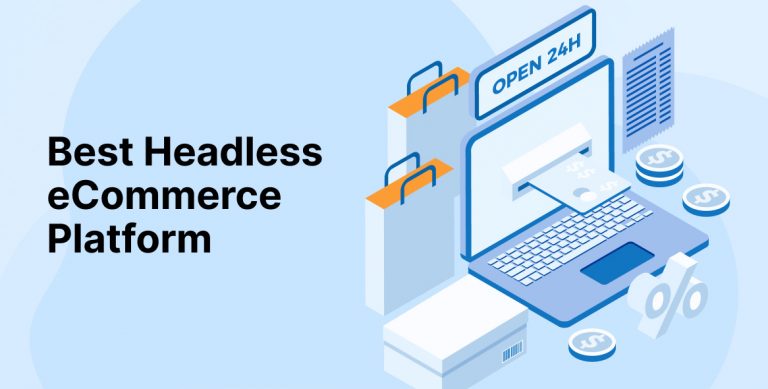
In today’s time, headless commerce has become a new trend in the eCommerce market. This approach is bringing an evolution in online commerce. It is a concept where the online store is decoupled which means that the front-end and the back-end of the store can work differently without affecting each other’s process. To take the best advantage of this trend and convert the traditional eCommerce platforms to headless eCommerce platforms, businesses hire eCommerce development service providers.
According to Statista, the term “e-commerce market” refers to the business of selling tangible products to individual consumers via the use of digital means that is B2C. Any purchases made on any digital platform generate a certain revenue. Below is the graphical representation of Retail eCommerce revenue in the United States from 2017 to 2027.

To know more about headless eCommerce and see which platforms offer this approach that can give flexibility and scalability to eCommerce businesses, let’s go through the definition of headless eCommerce and have a look at the best headless ecommerce platforms.
1. What is Headless eCommerce?
A headless eCommerce means a system that can decouple the front end from the back end of the eCommerce platform. Basically, the front end of the eCommerce site which is the customer-facing part, and the back end where the business logic is licensed to run the entire site, get a decoupled commerce system. This means that both these parts can be edited without interfering with each other.
Headless eCommerce platforms come with one of the biggest benefits which is flexibility. These offer flexibility to the developers of eCommerce teams for creating unique solutions. Besides, it also inspires a lot of confidence in the team members. Headless eCommerce has the capability to offer customizable experiences on both ends which is to eCommerce business owners and shoppers. This is what makes it a freeing solution for organizations who have been using traditional eCommerce platforms. In addition to this, when businesses are using a headless eCommerce system, it is easier for them to meet the brand and customer requirements. In this approach, the frontend and backend of an eCommerce store are coupled together which means that the businesses can work around the existing front end without affecting the back end.
Basically, headless commerce platforms are created to offer flexibility to companies of all sizes. With this approach, organizations can easily deliver highly customized experiences through any device. This is why it is said that headless ecommerce platforms are the reason behind the evolution of the eCommerce world.
Headless eCommerce has been so much in talk that there have been plenty of articles mentioning it. Here is a graphical representation of numbers of articles mentioning headless eCommerce from 2016 to 2020.

2. Best Headless eCommerce Platforms
Some of the most popular headless ecommerce platforms are –
2.1 Shopify

Shopify is one of the most popular headless eCommerce platforms in the market. It is known for its security and stability for huge app stores. Shopify was a standard eCommerce platform for a very long period but after its GraphQL API launch, it has suddenly become compatible with headless commerce platforms.
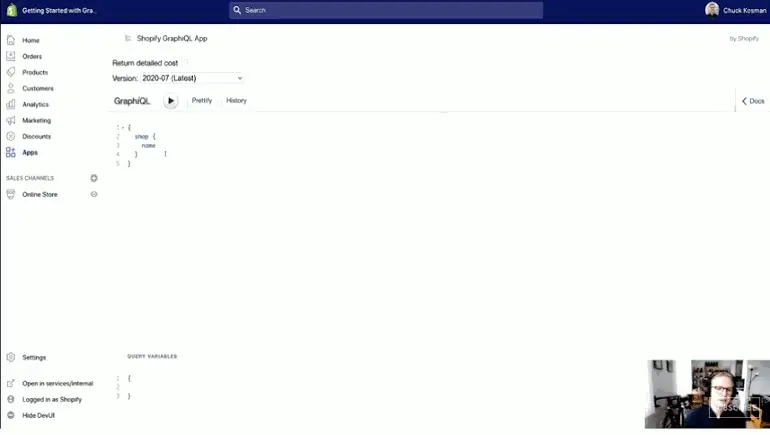
This service is offered to eCommerce organizations through Shopify Plus. This version is propelling us into the modern age. It has not only helped to hold its place in the market but also created a new market in the eCommerce world by becoming the world’s most relevant and trusted eCommerce platform.
Shopify Plus, the top headless eCommerce platform enables businesses to publish their sites on any channel with entire creative control that comes with different devices and touchpoints. Besides this, it also enables eCommerce business organizations to integrate their systems that make the business run. These systems include CMS, CRM, PIM, and ERP. In addition to this, there are even applications for services like Slack, Google Sheets, MailChimp, and Apple Business Chat to communicate with the client which can be integrated with the headless eCommerce platform of any company. Integration with third-party marketplaces like Amazon and eBay is also possible with Shopify Plus.
Shopify headless eCommerce platform offers unique services, stability, an intuitive content management system, and an easy-to-understand dashboard. Shopify Plus also offers highly customizable services which include customization of product display, themes, discounts, checkouts, and payments.
Pricing: The starting package of Shopify Plus starts from $2,000/month as per the sales volume of the business.
Pros:
- It comes with GraphQL Storefront API that enables fast designing of the web store by engaging storefronts for mobile, web, and video games.
- Shopify Plus offers a backend that has high-speed performance, automated business workflows, omnichannel selling, the ability to scale, and more.
- With the help of this headless commerce system, businesses can turn any screen into a digital storefront. For instance, mobile apps, web pages, smart mirrors, wearables, and more.
- One can manage all the digital selling business channels from a single backend ecommerce functionality.
- Shopify stores can be easily integrated with the existing content management system in order to publish and update the content of the storefront instantly.
- Seamless integration with third-party front-end systems and tools like CMS, CRM, ERP, and more is possible with Shopify’s headless ecommerce platform.
- Businesses can customize the front of their eCommerce stores with an intuitive editor.
2.2 Magento (Adobe Commerce)

Magento is also known as Adobe Commerce. It is one of the highly customizable headless commerce platforms. This traditional eCommerce platform has converted itself into one of the most popular headless eCommerce solutions that can be used by web developers to create custom eCommerce applications that fit customer requirements. Magento comes with several omnichannel solutions that are stored on the cloud. These omnichannel solutions make it easy for businesses to combine their brick-and-mortar shopping center and digital platform seamlessly.
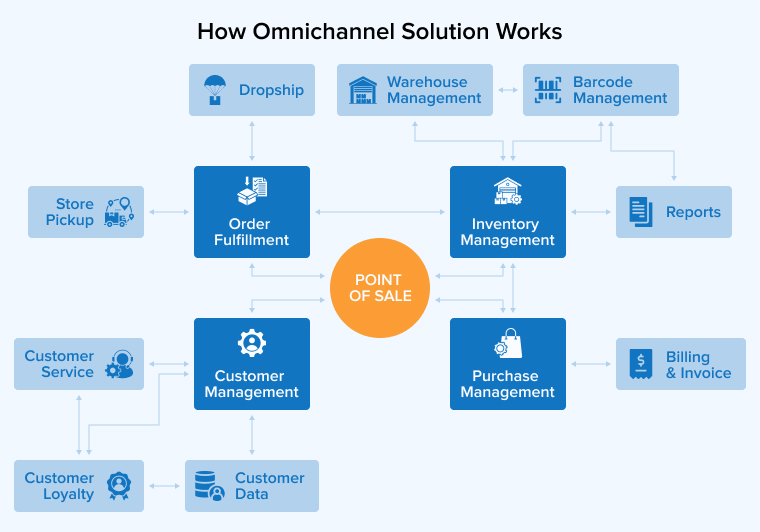
Magento offers an easy-to-use inventory management system that enables businesses to track their in-stock products across all locations which include warehouses and stores. This is all done in real-time which makes it easier for any online store to track the stock and check the availability of products. Besides, Magento is a famous eCommerce service provider which is best at offering analytics that helps in enhancing the data visualization of any business. With the help of Magento, organizations can easily export the data to an inbox by providing insights into lifetime value, retention rates, average order value, and more for a specifically selected timeframe.
Basically, Magento is one of the top headless eCommerce solutions that enable custom integrations through the SOAP and REST web API(Application Programming Interface) frameworks. It enables businesses to create ERP, PIM, CRM, CMS, inventory management systems, and more.
Pricing: The price of Adobe Commerce, formally known as Magento Commerce starts from $22,000/year as per the business organization’s revenue.
Pros:
- Magento offers complete flexibility when it comes to creating any custom front-end experience with the use of any technology.
- It enables innovation on new touchpoints without the need to upgrade the backend of the eCommerce website.
- The same services and APIs are applied for all touchpoints and this is the reason why it ensures a frictionless customer experience.
- Integration of eCommerce sites with frontend platforms or third-party CMS is possible with Magento.
- Separation of both frontend and backend development means that when changes are made in the frontend code they can be deployed independently from the backend of the site.
- Magento comes with commerce-integrated tools such as Page Builder.
- With the help of Adobe Commerce, developers can create progressive web apps with PWA Studio.
2.3 Salesforce Commerce Cloud (SFCC)

Salesforce Commerce Cloud is also a popular headless eCommerce platform that was created by a company named Salesforce which is well-known for its CRM. This company offers the world-class Commerce Cloud that any business organization can access to have an agile and highly secured business site. Salesforce Commerce Cloud also offers a partner app ecosystem that enables businesses to integrate with different augmented reality systems and the marketplace.
The shoe on this desk is not real, it is augmented reality (AR).
— Vala Afshar (@ValaAfshar) September 25, 2022
The future of digital marketing and e-commerce will be powered by AR. pic.twitter.com/njYEGl80xT
SFCC enables business organizations to connect their stores with CRM seamlessly. This helps in customizing client interactions by unifying all business data. It leads to increasing the business revenue across multiple channels.
Basically, Salesforce Commerce Cloud is used by businesses as it is the best headless CMS that comes with automation and artificial intelligence support to help bring the business site to the clients.
Pricing: The price of Salesforce Commerce Cloud depends on the type of business models such as B2B2C, B2B, or B2C. For more information about pricing you can contact or visit Salesforce Commerce Cloud Pricing page.
Pros:
- Salesforce Commerce Cloud offers easy-to-customize storefronts with various templates and developer toolkits.
- With SFCC, the developers get access to the PWA kit which is ready to build mobile-first storefronts.
- It offers security monitoring, a headless content delivery network, and a web application firewall.
- Salesforce Customer 360 platform comes with easy-to-manage customer data across marketing, service, and sales.
- It provides a system that enables managing millions of SKUs and hundreds of stores from a single backend system.
- Commerce-managed runtime of SFCC offers a lighting-fast storefront.
2.4 BigCommerce Enterprise

This is a prominent hosted eCommerce platform that is packed with all-in-one top features that are required by businesses to create their online stores. BigCommerce Enterprise enables businesses to drop their traditional eCommerce platforms and adapt to new-age solutions that come with the highest level of all eCommerce features. It’s headless commerce platform helps businesses create unparalleled customer experiences. This offers the most advanced headless integration.
It comes with a wide range of headless solutions that are ready to be used. These solutions are CMS, front-end frameworks, and digital experience platforms. Besides this, BigCommerce also helps businesses to launch their store faster and customize it as per the user’s requirements without any issues. Basically, BigCommerce headless is made for both developers and store owners’ freedom. This means that it is a perfect solution when it comes to creating a store that has a combination of commerce and content.
Pricing: The price of it’s package is available upon request.
Is there a reason that all of these platforms intentionally make the pricing obscure? We are a partner and we don’t even really know how they come up with the @BigCommerce enterprise pricing.
— TJ Gamble | Ecommerce Aholic (@ecommerceaholic) February 3, 2021
Full Conversation: https://t.co/XT9D0NW6ya#ecommerce #bigcommerce #ecommerceaholic pic.twitter.com/mc4uGH6RpW
Pros:
- BigCommerce comes with a sophisticated API architecture to build custom solutions for complex front-end requirements.
- It offers blazing-fast web store performance that enables businesses to stay ahead of their competition and this is because of the server-side rendering & static-site generation features of this platform.
- BigCommerce enables the creation and management of multi-storefront for headless storefronts.
- With this headless ecommerce platform, businesses get multiple headless solutions to integrate CMS, ORM, DXP, and frontend frameworks.
- BigCommece can handle around 600 SKUs per product.
2.5 Commercetools

CommerceTools is a popular headless eCommerce platform that enables businesses to extend their possibilities of digital commerce. It is the best headless eCommerce tool to break the defined limitations of traditional platforms. The reason behind it is that this tool offers a decoupled and open-environment approach that ensures limitless capabilities. In addition to this, CommerceTools, the headless eCommerce platform is created using MySQL and PHP which enables it to separate the storefront with the use of specific APIs. This means that developers can use this tool to easily compose the store experiences.
Pricing: The price of this tool is available upon request.
Pros:
- This ready-made headless commerce offers building blocks to develop a backend structure.
- It comes with some of the most powerful commerce features and functionalities like unified cart, catalog management, order management, and machine learning.
- CommerceTools enables businesses to manage all sales channels from one business interface.
- This tool comes with a facility that helps specify how APIs behave.
- The API-first approach of this tool offers various features and headless commerce functionality that help in connecting the backend and frontend seamlessly with the help of APIs.
- CommerceTools offer flexible and scalable headless ecommerce platforms with 60-day free trials.
2.6 Elastic Path

Elastic Path is one of the most important headless eCommerce platforms in this list with a composable and API-first approach. This headless commerce solution enables brands to launch their digital commerce experiences and deliver their services across the globe to multiple touchpoints and markets. Elastic Path offers headless architecture that supports omnichannel commerce. With this tool, APIs can help the online store connect itself with various commerce tech stacks like search & merchandising tools, ERP systems, and more.

Basically, Elastic Path is a modern tool that showcases the advantages of a headless commerce platform by offering different services.
Pricing: The price of Elastic Path, the headless CMS is available upon request. Visit Elastic Path Pricing page for more information..
Pros:
- Elastic Path comes with a strong ability to customize the features for end-users.
- It offers optimized omnichannel experiences.
- Seamless integration with existing frontend systems like POS, ERP, CMS, and more is possible with this tool.
- Frontend technology available in this platform includes AR experience, PWA, Alexa Skill Reference, and Facebook chatbot.
- Elastic Path offers a flexible cloud-agnostic deployment approach.
2.7 SAP

SAP is a leading ERP platform that is used to adopt automation, and high-level analysis and fasten the business processes based on system-generated reports. Also, the software is very helpful in order to improve and streamline internal business processes such as inventory management, sales, distribution, logistics, material management, accounting, etc. Eventually, it also benefits the future forecast of business growth.
SAPs reputation has been gained through years of providing high-class ERP systems to millions of businesses worldwide. As a market leader in ERP, SAP software helps all business sizes to centralize data management, thus better managing complex business processes across different departments.
SAP Commerce is SAPs exclusive headless eCommerce platform that supports innovation and profitable growth. This is a simplified and reinvented commerce solution for both growing and large businesses.
Pricing: The price of SAP Commerce is available upon request.
Pros:
- SAP Commerce enables easy integration with a rich partner ecosystem.
- This headless architecture supports multilingual catalogs for online businesses.
- It enables businesses to easily adopt new customer touchpoints.
- Organizations can manage multiple storefronts from the same business account as this tool offers a built-in feature for multiple touchpoints.
- It is easy to scale up using this platform as it has the ability to handle large traffic.
- It offers agility that helps in enhancing customer experience.
2.8 OroCommerce Enterprise

OroCommerce is another headless solution in this list that is an open-source eCommerce platform. It is used by B2B enterprises. Besides the headless approach, this tool also offers traditional methods to the B2B, B2C, and B2B2C companies to unify third-party frontend solutions and strong commerce backend software like ERP or CRM.

Pricing: The price of OroCommerce is available upon request.
Pros:
- OroCommerce enables management for multiple storefronts through one single panel.
- It offers powerful built-in B2B features such as customer corporate accounts, promotion management, and personalized catalogs.
- OroCommerce comes with a B2B-first marketplace management system which means that the self-service portals can streamline both sellers’ and buyers’ operations.
- It has an active community of more than 20k registered developers.
- It offers the facility to integrate the online store with multiple third-party software in order to enhance business operations.
- OroCommerce offers a built-in multi-channel customer relationship approach to offer a 360-degree view of both customers and businesses.
2.9 Spryker

Spryker is also a popular open-source eCommerce platform. The main goal of this platform is to offer high-class solutions for eCommerce businesses, be it for small and large firms. It is a headless ecommerce platform that uses API-based and composable architecture.
Spryker is a tool of the eCommerce industry that enables developers to use its Glue API to get connected to any front end and develop a unique headless experience.

Besides this, it also offers a voice assistant or smart shelf that can help businesses to detect the stock of the products on the shelf using sensors. In addition to this, Spryker has a difficult learning curve for developers.
Pricing: The price of Spryker is available upon request.
Pros:
- It is a strong and comprehensive eCommerce platform that comes with unique features like free hosting, free site-side HTTPS, and real-time shipping quotes that satisfy large enterprises.
- Spryker offers a flexible headless structure that comes with a ready API which enables customization of solutions and frontend integrations.
- It offers various business models like B2B, B2C, enterprise marketplace, and more.
- It offers exclusive technologies like voice assistance, near-field communication, smart shelves, and more that help in enhancing the performance of the online store.
- Spryker offers fast deployment even for large and complex business sites.
2.10 Saleor

Saleor is the last headless commerce platform on this list. It is an open-source, GraphQL-first eCommerce platform. This headless ecommerce platform was created to satisfy developers first. The main aim of this platform is to offer a customized omnichannel experience for eCommerce stores.
Saleor uses the power of headless ecommerce technology to offer a flexible, finely crafted, and complete commerce package. It helps the developers to achieve absolute flexibility with the help of JAMstack, GraphQL, Next.js, and modern front-end tools.

Pricing: Saleor Open-source is published on GitHub, so it can be downloaded from there and used for free. But Saleor Cloud is a SaaS product with open-source benefits and its price is available on request.
Pros:
- Saleor supports multi-warehouse, multi-channel, multi-language, and multi-currency under the same account.
- It helps in managing multiple storefronts, devices, and applications from a single back-end.
- Saleor offers a PWA-ready approach for the mobile commerce experience.
- It offers zero maintenance to handling, scaling, securing, and updating the infrastructure.
- Easy integrations with other software like POS, PIM, CMS, and CRM are possible with this tool.
- Saleor helps in controlling data storage with US and EU data centers.
3. Benefits of Headless eCommerce
Some of the major benefits of headless ecommerce are –
The Benefits of Headless #eCommerce https://t.co/Kk6530L8yr #omnichannel pic.twitter.com/0Gnop3BONS
— MuleSoft (@MuleSoft) August 28, 2017
3.1 Seamless Integrations
Generally, headless eCommerce platforms are driven by API. This clearly means that these platforms can be easily integrated and configured with third-party applications if needed. Headless eCommerce communicates in coding languages with the store’s front end, which can be configured with other third-party eCommerce platforms like CMS and CRM.
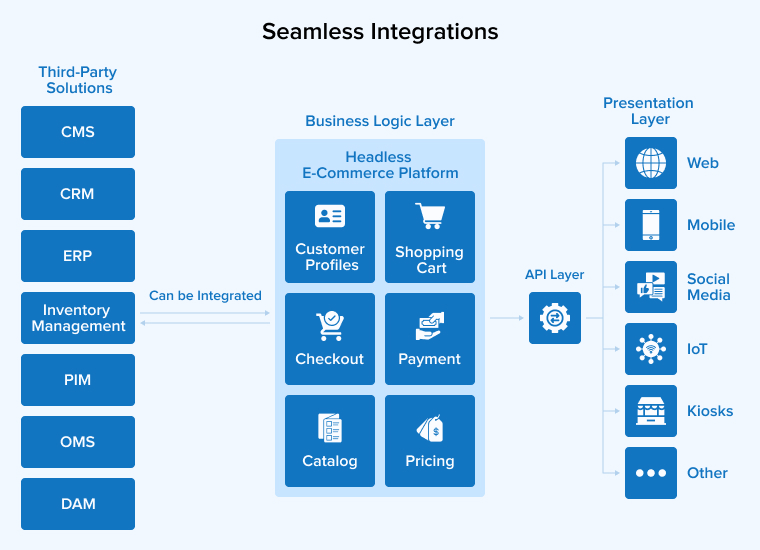
Basically, headless platforms make it easier for eCommerce store owners to handle their business and upscale it.
3.2 Omnichannel Capability
Omnichannel marketing is a concept that works like a charm for eCommerce businesses. It enables headless eCommerce store owners to create omnichannel stores that can cover various devices. This means that the store can reach various shoppers through different devices and make their buying journey easy. Besides, whether it is desktop or mobile apps, the checking out module or payment module is the same for the buyers and is highly secured too.
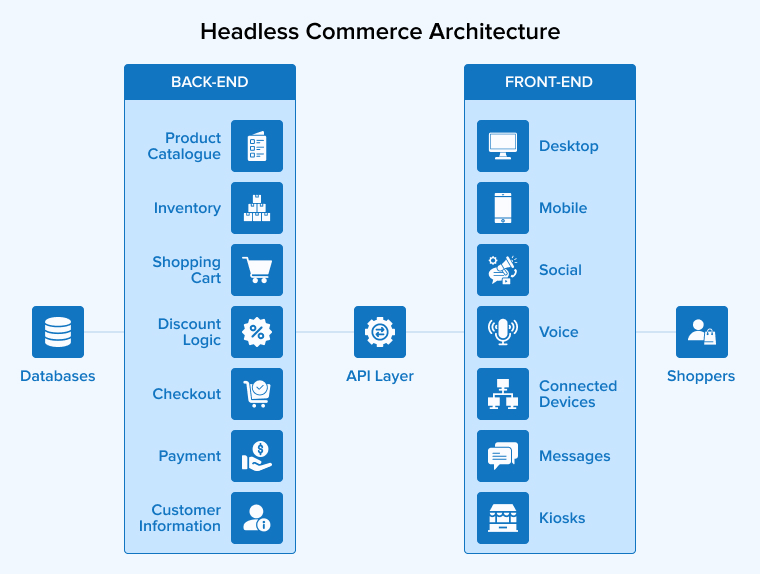
3.3 Minimize Site Downtime
For any eCommerce website, updating is a crucial part. The main reason behind it is that the updates can improve the performance of the store. If it is not updated on time, the website may suffer from downtime. This is why frequently updating the store for security or performance reasons is necessary. When it comes to deploying updates on headless eCommerce platforms, the process is smoother than ever because of the APIs. Headless eCommerce platforms enable businesses to update their stores and minimize downtime during the updates. All these offer a seamless user experience.
The rolling upgrade shown here enables you to utilize the current servers and upgrade them one by one while continuing to serve HTTP traffic with the remaining computing resources.
3.4 Agility & Flexibility
Headless commerce platforms support various new and latest technologies. As a result eCommerce software development companies can make use of these platforms as marketing tools to launch multiple sites for different divisions, brands, and portfolios. This means that headless eCommerce solutions offer flexibility to businesses who want to change their site as per the client’s preferences overnight.
3.5 Unlimited Customization
The headless commerce approach enables developers to create an online store that is customized and centralized. With this concept, the developers can centralize content and offer it anywhere via API. Headless commerce architecture enables faster delivery of the product than traditional eCommerce platforms so that it can offer the best customer experience. Basically, Headless platforms have the capability to eliminate information silos as all the client’s shopping data is centralized. This means that the client’s information can be kept secure and they can get a customized solution.
4. Summary
As seen in this blog, headless eCommerce platforms are very popular amongst online business owners and the main reason behind it is the benefits this approach has to offer. Headless platforms provide personalized customer experience, flexible development, and seamless integration which makes businesses improve their performances. Besides this, if organizations have proper development resources then a headless transformation is a smooth process. But this approach might not be a perfect fit for all the businesses in the market, so consulting eCommerce app development companies for this is advisable.


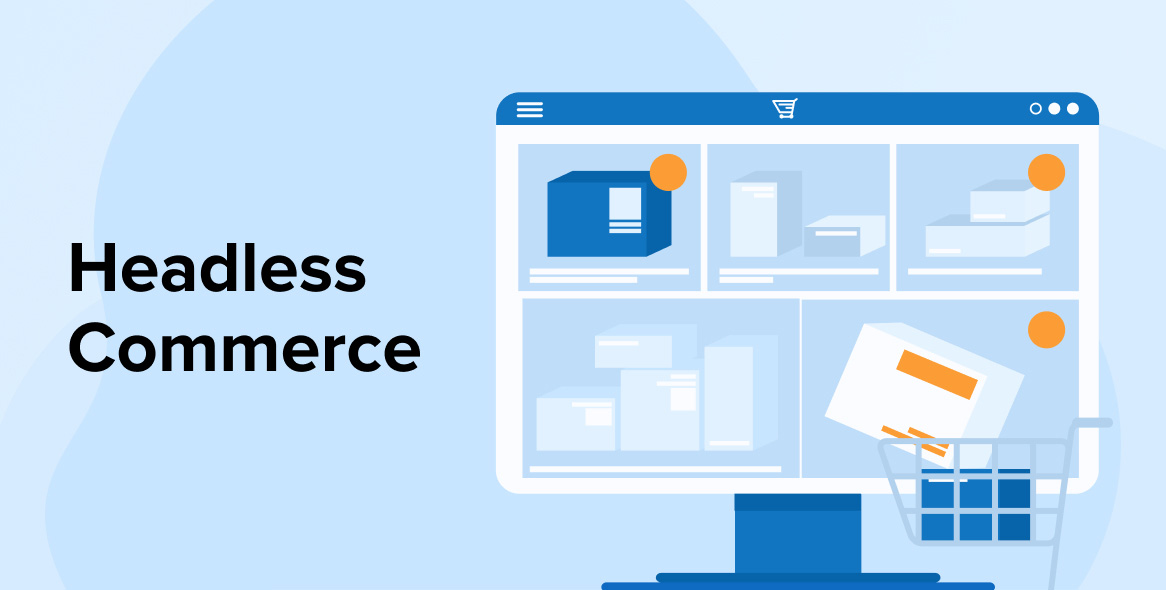
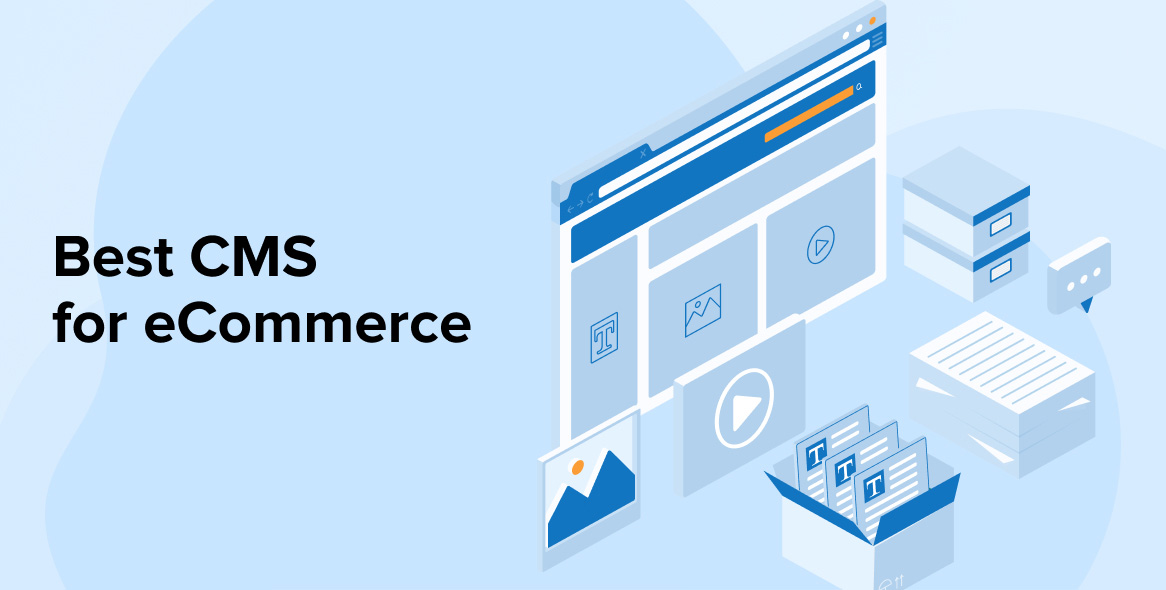
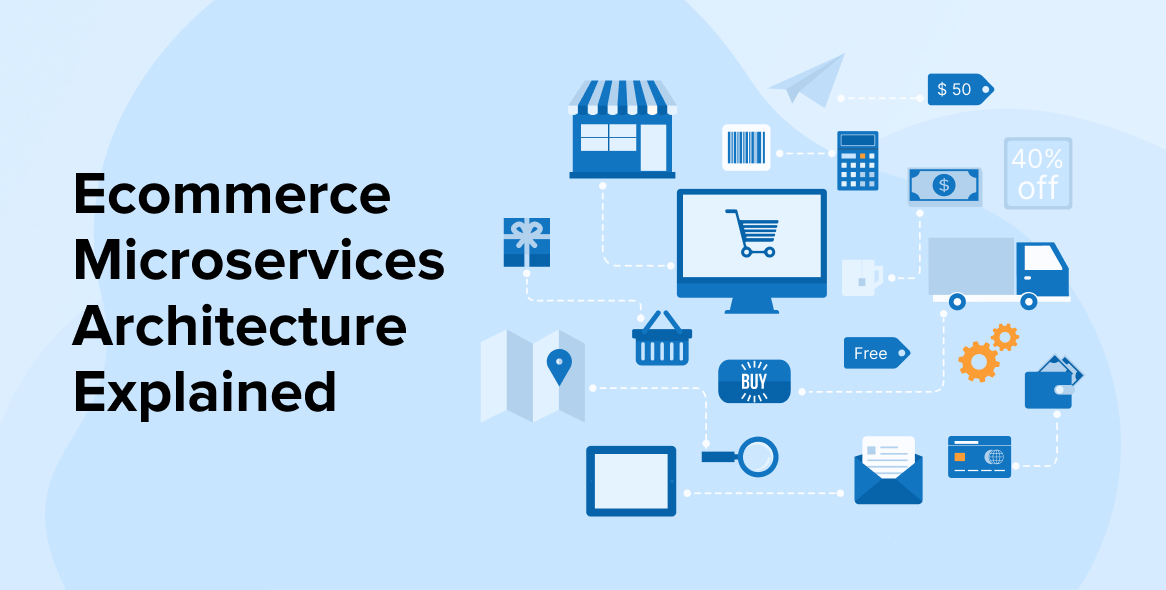

Comments
Leave a message...